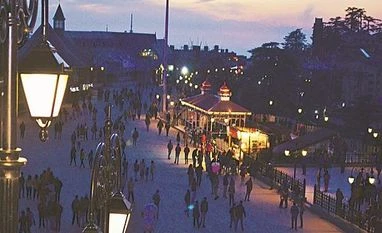Ahead of New Year’s Eve, coronavirus-induced curfew hours are turning out to be a party pooper for restaurants and hotels in several states. The hospitality industry, wrecked by the pandemic this year, saw a glimmer of hope during Diwali. But a month later, localised spikes in Covid-19 cases have dashed hopes of a cheery end to 2020.
In Maharashtra, a 15-day night curfew starting last week had already dampened Christmas festivities. In north India, night curfew of varying duration has been imposed in Punjab, Himachal Pradesh and Rajasthan, while Uttarakhand has banned public celebrations. In Delhi, too, the mood is far from upbeat despite the lack of curfew timings.
Meanwhile, strict conditions such as trimmed guest counts or no parties beyond 9 pm or 10 pm have led hotels to hardsell the idea of staycation with offers that include a sundown dinner and delayed check-out.
In Himachal, people flock in to savour the winter chill and also anticipate a snowy New Year bash. But this time around, there is just silence.
On New Year’s Eve alone, hotels in the hill town of Shimla claim to earn as much as they normally do in a month. “There are more than 100,000 tourists walking down the Mall (Shimla’s nerve centre) at any given time on December 31. That is like a capacity crowd at the Eden Gardens (cricket stadium in Kolkata),” says Himanshu Nag, owner of Tourist hotel, an amusement park-cum-restaurant at Kufri. “Imagine how much the hospitality industry gains from it. But this year will see none of that,” he adds.
Although the state government had shortened the night curfew by an hour so that it starts at 10 pm, it’s seen as making no meaningful difference.
“An hour makes little sense for hoteliers and restaurateurs like us. New Year revenue comes from late-night parties. But we will have to adhere to the early deadlines. The profits will obviously be less,” says Varun Jain, the owner of Hotel Whispering Winds in Kasauli.
Rajasthan has been one of the worst hit states. The tourist season had only just begun, and bookings from Gujarat and Madhya Pradesh were surging when the government imposed night curfew on all major cities on New Year’s Eve.
“Who will turn up for a 6.30 pm dinner party? People order evening tea at that hour,” rues Birender Tapariya, owner of Hotel Glitz in Jaipur.
Smaller towns have been exempted from the curfew, but they do not attract many tourists.
Hotels in major tourist hubs such as Jodhpur, Jaipur and Udaipur had recorded occupancy of 20 to 25 per cent around Dussehra and Diwali. But Christmas was a dull affair. And things are unlikely to be any brighter for New Year Eve.
The concept of staycation has not taken off in Rajasthan. What tourist would want to book a room and then have dinner at 6.30 pm, says Sanjay Kaushik, owner of Jaipur-based travel agency Rajputana Holiday Makers. “After a year of battling a pandemic comes a day to celebrate, but the curfew has dealt a body blow to the industry,” he adds.
In Delhi, which has recently emerged from a phase that witnessed the sharpest rise in the daily count of Covid-19 cases, Christmas was muted even in the absence of curfew. Hoteliers admit that a good turnout for New Year would be a surprise.
“The atmosphere is one of restraint. What do you expect with the guest list restricted to 50 at a time?” says Priyank Sukhija, chief executive officer and owner of First Fiddle Restaurants, which has among its brands Plum, Café JLWA, Warehouse Café, Tamasha, Dragonfly, The Lazeez Affair, to name some. Sukhija doesn’t see business improving in his Mumbai outlets either.
Sylvain Laroche, director of operations, Ibis & Ibis Styles India, is, however, hopeful. “There is demand for staycations and weekend getaways in many of our hotels.”
The pandemic has shortened Ibis’s booking window, but, Laroche adds, the hotel chain is counting on the frequent changes in Covid-19 guidelines working in favour of the hotel chain, come December 31. “We are definitely expecting a lot of last-minute bookings.”
In Mumbai, meanwhile, “people are mostly opting a party in the suburbs or heading to Lonavala, Khandala and Alibaug,” says Rohit Kapoor, CEO, India & South Asia, Oyo. “Staycations have, however, picked up in the city and bookings are up by 20 per cent.”
It is certainly not a great time, adds Ajay Bakaya, owner of Mumbai’s Sarovar chain, though occupancy has improved.
In Punjab, if the Christmas experience, when brunch replaced the conventional dinner, is anything to go by, then New Year Eve might also prove dull. “Day-time meal is mostly a hurried affair compared to celebrations at night, which are not an option now due to the curfew (10 pm-5 am),” says Sandeep Dua, director, PR communications, for Radisson Blu Ludhiana. “It obviously means less business.” The hotel is, instead, focusing on staycations and is offering a complimentary bottle of liquor to guests checking in.
Even so, it is likely to be a year that will end with a quiet and early dinner. “You can enjoy the ambience of the hotel,” says Akshina Sauhta, marketing communications and PR manager at Hyatt Amritsar, “but there will be no parties.”
Unlock 30+ premium stories daily hand-picked by our editors, across devices on browser and app.
Pick your favourite companies, get a daily email with all news updates on them.
Full access to our intuitive epaper - clip, save, share articles from any device; newspaper archives from 2006.
Preferential invites to Business Standard events.
Curated newsletters on markets, personal finance, policy & politics, start-ups, technology, and more.



)